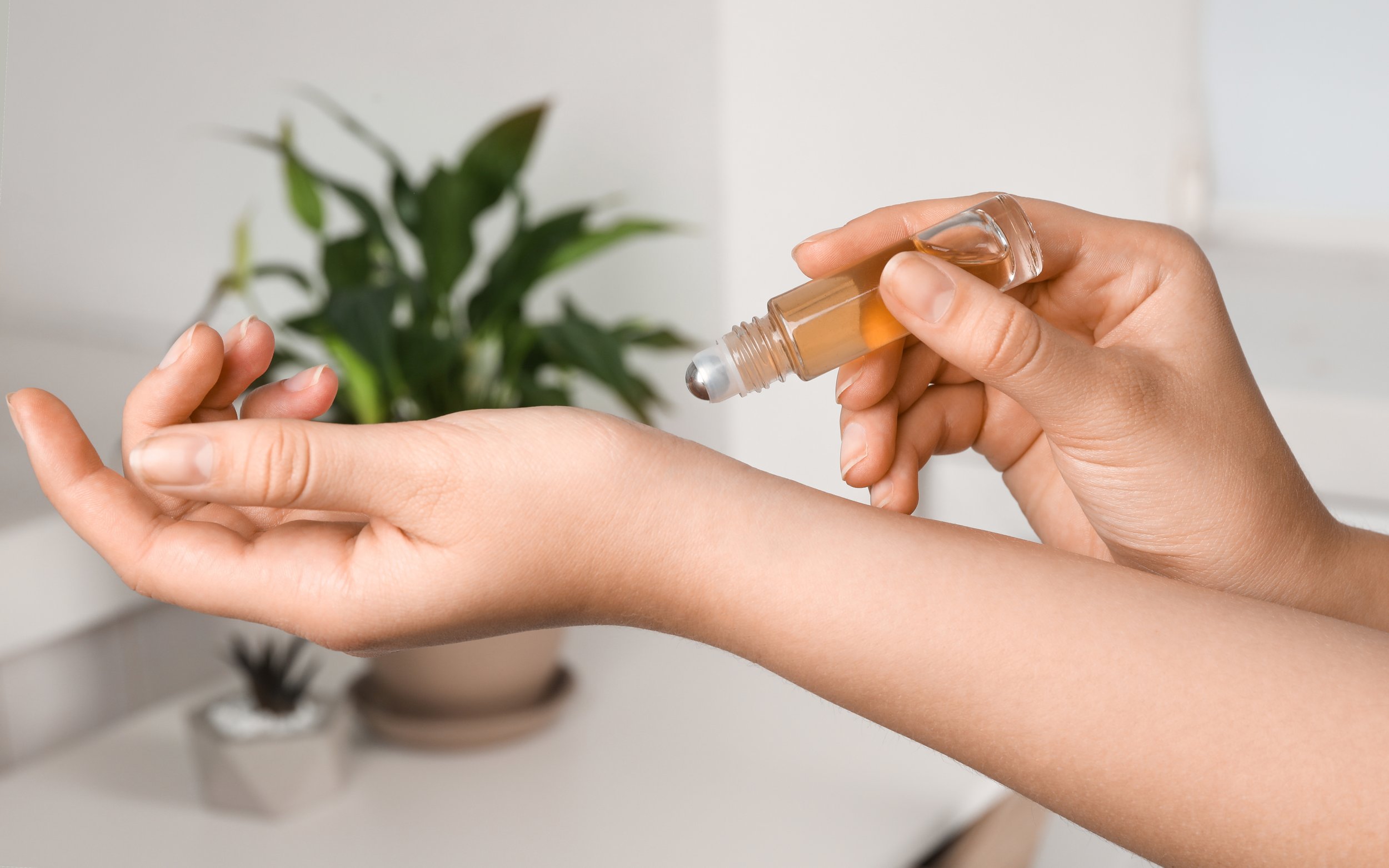Peaceful Pregnancy: A Guide to Essential Oils for Expecting Moms
I often think back to when I first started using essential oils, and honestly, my only regret is not discovering them sooner. If I had known more about their therapeutic benefits, I would have reached for them during every pregnancy—not just my last two. From easing morning sickness to blissful sleep, I’ve realized there truly is an essential oil to support every trimester.
And let’s be real—blissful sleep while pregnant? Who am I kidding? Between restlessness, insomnia, racing thoughts, and sheer exhaustion, sleep felt like an elusive dream. Add in “mom brain,” constant tossing and turning, and the challenge of finding a comfortable position that lasts more than 30 seconds—yeah, blissful isn’t the word I’d use. Meanwhile, my partner snored loud enough for the neighbors to admire how well he was sleeping.
And of course, the need for essential oils doesn’t stop once baby arrives. If anything, it grows. From soothing the emotions of postpartum life to caring for those forever “tiger stripes” (stretch marks, my favorite battle scars of all time), essential oils have been there for me every step of the way.
As a mom of five, I can truly attest to the power and beauty of essential oils and aromatherapy during pregnancy. For those choosing a holistic approach, aromatherapy can be an incredible tool to support both body and mind. Whether you’re experiencing your very first pregnancy or your last, knowing how to use essential oils safely is key—especially during the first trimester when your pregnancy is still being established.
My hope is that this guide helps you feel more confident in incorporating aromatherapy throughout pregnancy, one gentle drop at a time.
So, how exactly can aromatherapy support you during these months? Jane Buckle, aromatherapy educator and author of Clinical Aromatherapy: Essential Oils in Healthcare, notes:
“Aromatherapy can be helpful for many symptoms of pregnancy, including general tiredness, aches and pains, nausea, insomnia, and backache.”
Having essential oils on hand gives you natural, supportive options for easing the many discomforts that can arise during pregnancy. Below, you’ll find simple and safe ways to use aromatherapy for pregnancy support.
Safety First: A Mama’s Guide to Essential Oil Dilution for Pregnancy
As a general safety precaution, it is advised to use a 1% dilution during pregnancy. The use of undiluted essential oils should also be avoided during pregnancy to reduce the risk of potential contradictions. Following proper safety protocols while using essential oils during pregnancy can limit the risks of adverse skin reactions, such as; redness, itching, burning, or blisters. Essential oils should be used with care, consideration, and moderation during pregnancy; keeping in mind that every pregnancy is different.
“Diluting such oils so that the resulting solution becomes non-irritant, may require diluting them to concentrations much lower than in normal circumstances” -Kurt Schnaubelt
Here’s a clear, easy-to-follow guide for making a 1% dilution of essential oils based on different amounts of carrier oil. A 1% dilution means you’re using 1 drop of essential oil per 5 mL (1 teaspoon) of carrier oil.
1% Dilution Guide (Safe for Pregnancy, Children, and General Use)
5 mL (1 teaspoon) carrier oil → 1 drop essential oil
10 mL (2 teaspoons) carrier oil → 2 drops essential oil
15 mL (1 tablespoon) carrier oil → 3 drops essential oil
30 mL (2 tablespoons / 1 ounce) carrier oil → 6 drops essential oil
60 mL (4 tablespoons / 2 ounces) carrier oil → 12 drops essential oil
120 mL (8 tablespoons / 4 ounces) carrier oil → 24 drops essential oil
Not all essential oils are safe to use during pregnancy, as some may stimulate uterine contractions, affect hormones, or pose risks to the developing baby. It’s important to choose pregnancy-safe essential oils and avoid those that may cause complications.
Unwind & Breathe Mama: Helpful essential oils during pregnancy:
I love having essential oils at my fingertips, and I have especially enjoyed using them to promote, soothe, and relieve various pregnancy-related symptoms. I have found them to be beneficial for several different symptoms associated with pregnancy. One of my favorite uses is supporting headaches naturally, without the use of over-the-counter medications.
Some essential oils I love using while pregnant include:
Lavender
Ginger
Lemon
Chamomile
Cypress
Peppermint
Eucalyptus
Bergamot
Sweet Orange
Here are a few of my favorite recipes during pregnancy:
Headache Roller: Roll on, pain off
Ingredients:
10 ml Jojoba Oil
2 drops Peppermint essential oil
1 drop Lavender essential oil
Directions:
Add essential oils to 10ml roller bottle.
Fill the rest with carrier oil.
Cap and gently shake to combine.
To use: Apply to temples, back of neck, and shoulders to help soothe headache pain.
*This recipe is 1% dilution
Morning Sickness Survival Inhaler
Ingredients:
Aromatherapy inhaler
6 drops Peppermint essential oil
4 drops Lemon essential oil
4 drops Ginger essential oil
Directions:
Add essential oils to cotton wick of aromatherapy inhaler
Reassemble aromatherapy inhaler
To use: Inhale slow deep breaths, holding for 5-10 seconds before exhaling. Repeat as needed to soothe nausea.
Back Pain Relief Massage Oil
Ingredients:
2 oz. Fractionated Coconut oil
6 drops Peppermint essential oil
3 drops Lavender essential oil
3 drops Frankincense essential oil
2 oz glass dropper bottle
Directions:
Combine essential oils in glass dropper bottle
Add fractionated coconut oil
Cap and gently shake to combine
To use: Apply to the affected area for pain relief, as needed.
*This recipe is 1% dilution
Sniffing out the facts: How inhalation can support expectant mothers
In addition to topical use, I often turn to aromatherapy through inhalation. When I’m experiencing nausea, I usually choose direct inhalation—simply smelling an oil right from the bottle. This is one of the easiest and most common methods, but you can also place a few drops (2-4 drops) on a tissue or cotton ball and breathe in the aroma.
How to use: Hold the tissue just beneath your nose and gently inhale, taking 2–3 slow breaths through the nose. Repeat this 2–3 times a day, or whenever needed.
Another technique I love is direct palm inhalation. This involves placing a drop of essential oil into the palms, rubbing them together, and cupping your hands over your nose to inhale deeply. It’s a wonderful way to ease stress, uplift your mood, or simply relax and breathe. For an added benefit, you can lightly run your palms through your hair or over your clothing to carry the aroma with you throughout the day.
“The best way to stimulate your sense of smell is simply to use it more. Be more conscious of smells. Find out for yourself which plants around you are aromatic; see if you can tell subtle differences in odor.”
Makin’ scents of it all:
Olfaction (our sense of smell) plays a major role throughout pregnancy, especially beginning in the early stages. There is a huge burst of new olfactory neurons during pregnancy, which are responsible for food aversions, nausea, and sensitivity to smells. (3) Things you may have enjoyed smelling before pregnancy may now make your stomach turn. Certain foods you once enjoyed may not be appealing to you anymore due to the aroma of the food. I used to CRAVE peanut butter and jelly sandwiches with my first pregnancy, but by the time my second pregnancy came along, I could no longer tolerate the smell of peanut butter.
Due to a heightened sense of smell during pregnancy, it’s important to choose a blend of essential oils that you find aromatically pleasant at that time. This may differ from aromas that you previously enjoyed. I typically gravitate towards citrus oils such as lemon, orange, lime, grapefruit, bergamot and tangerine. Due to their monoterpene content, citrus oils are incredible mood boosters – Goodbye grumpy, hello happy! Citrus oils rich in monoterpenes can help soothe nausea and assist with low energy levels as well – More peace, less noise!
Keep in mind, the use of citrus oils can pose risks, if used improperly. Photosensitivity may occur when applying citrus oils directly to the skin, and diluting them appropriately is advised. It is best to avoid sun exposure after topical use. While grapefruit contains a low risk of photosensitivity, Bergamot is especially phototoxic, (0.4% dilution recommended) so I advise extreme caution when going out into the sun if you’re applying it to the skin. To play it safe, I suggest not applying these essential oils directly to the skin throughout pregnancy. If you experience any adverse skin reaction, consult with a healthcare professional or dermatologist.
With a little knowledge and a lot of care, you can create a beautiful, aromatic sanctuary for your pregnancy journey. As you prepare to welcome your new baby, let the gentle power of aromatherapy help you find your calm so you can nurture your body and your baby, one beautiful aroma at a time.
Looking for more education on using essential oils? See the blog article, Ten Things I Wish I Would Have Known When I First Started Using Essential Oils.
References:
1. Buckle, Jane (2003). Clinical aromatherapy. Philadelphia, PA: Elsevier Science. 2. Shutes, Jade (2024) Ways to utilize aromatherapy and essential oils during pregnancy; Foundations of Aromatherapy
3. Cameron, E. L. (2014) Pregnancy and olfaction: a review. Frontiers in Psychology, 5. https://doi.org/10.3389/fpsyg.2014.00067
Disclaimer: This blog is for general informational purposes only and does not constitute the practice of medicine, nursing or other professional health care services, including the giving of medical advice. The use of information on this blog or materials linked from this blog is at the user's own risk. The content of this blog is not intended to be a substitute for professional medical advice, diagnosis, or treatment. Users should not disregard, or delay in obtaining, medical advice for any medical condition they may have, and should seek the assistance of their health care professionals for any such conditions.







